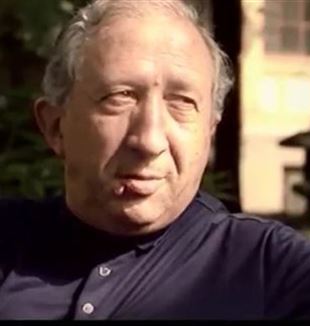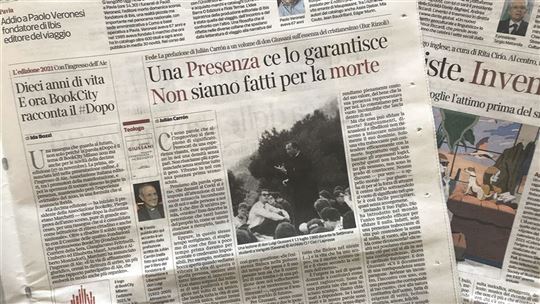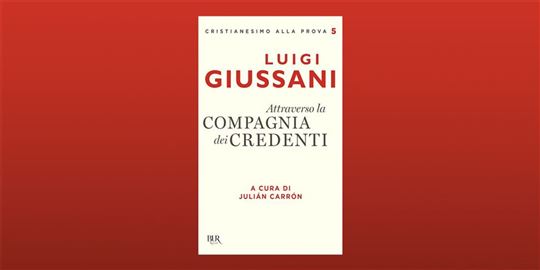
A presence ensures us: we are not made for death
Corriere della Sera has published an extract from the introduction of Giussani's recently published book: Attraverso la compagnia dei credenti [Through the companionship of believers].There are words which suddenly fill themselves with meaning. Provoked by a lived experience, they acquire, within us, an incomparable density. We become no longer able to utter them without feeling their weight. They vibrate within us with a previously unknown intensity.
Let’s think of the word “fear,” which, in the context of Covid, has imposed itself on everyone as a looming threat; to all of us and those we hold most dear. And what can be said about another word, “emptiness”? That word describes the perception that many have of their own ‘I’, as if nothing were able to fulfil it, as immeasurable as it is.
Yet, in this same vertiginous time, we have become amazed by things which, until not long ago, we took for granted or believed impossible. For example, we are left open mouthed when we see this person’s or that person’s vibrancy of life, whilst all those around them complain. We are thus surprised by the sparkle of positivity and a joy in the face of a friend, which envelops all of life in a unique intensity; we are overcome by a limitless gratitude for the fact that people like this exist, and for having been so fortunate to have encountered them on our journey. They challenge the widespread opinion that everything finishes in nothingness, and that there is no hope for the future. 
We can see that Fr. Giussani was consistently engaged with becoming aware of reality, to the point of identifying the battle between being and nothingness as the most decisive challenge with which modern man can engage. Where does this battle take place? “The ‘I’, our I, is the crossroads between being and nothingness.” At this crossroads, life emerges in all its drama, and one cannot avoid facing the key question: “Whether existence culminates in the dust of passing time, with its passing being nothing but the manifestation of a tomb or prison which will suffocate us–and we will die, uselessly–or whether time is pregnant with potential for the future.”
For Giussani, “both hypotheses are boundless: absolute nothingness, the nothingness of nothingness–and since it is at least tangible dust, we can say: an endless desert–or, instead, the responsibility of eternity, being faced with eternity.” These are two hypotheses which enter our orbit every morning; whether we want it or not, “every morning we are forced to choose between everything finishing in nothingness […] and a life with meaning,” between dying “like” dogs and living according to the “measure of eternity.”
The urgency of these questions within us is what makes us reasonable beings. They have such a weight that they leave no way out. We are called to respond. If our gestures and our words are without meaning, without dignity, we spend our time towards death, and our actions are empty. The Bible considers this way of life, void of meaning, to be a form of alliance with death. Yet even this way of life cannot completely erase one fact, a primary evidence: we are not made for death. We can recognize this most easily not when we think of ourselves and our own end, but when we lose a person truly close to us. That wound we feel when faced with their absence, in the moment of loss, reveals their value to us, and the goodness which their presence represented for us. We notice it due to the unbridgeable emptiness it leaves within us.
But what can challenge death? Reasoning, discussion and rebellions are unable to undermine its dominance in the slightest. Only an overabundant life can truly battle with death. Nowadays, in particular, logical arguments do not suffice, because these no longer convince anyone, they are not capable of convincing. No discourse–as true as it may be–or moral appeal–as correct as it may be–has itself the power to attract the “I” and extract it from the lack of meaning into which it is so easy to fall, almost without realizing it.
By sending us His son, God introduced into the world the only method capable of challenging nothingness. In fact, only a presence overflowing with life can compete with nothingness, emptiness, and fear. But how can we recognize this? “In reality, we can only recognize that which creates a correspondence within us,” Cardinal Ratzinger said. And Fr. Giussani: “An unparalleled correspondence can be identified. An encounter occurs, the encounter with One, with a presence which corresponds to your heart;” that is, the constitutive nature of man, made of the need for truth, beauty, justice, love, happiness.
For Fr. Giussani, it is always easy to recognize Him: “If Jesus is God made man, born from the womb of a young woman 15 or 17 years old, if Jesus is God made man, the way must be simple, the way in which a man wandering in the midst of his own needs can recognize Him has to be simple.” It is, first and foremost, an event made encounterable by this Presence; that is, something through which it can be found with one’s own senses, and can be seen, heard and touched.